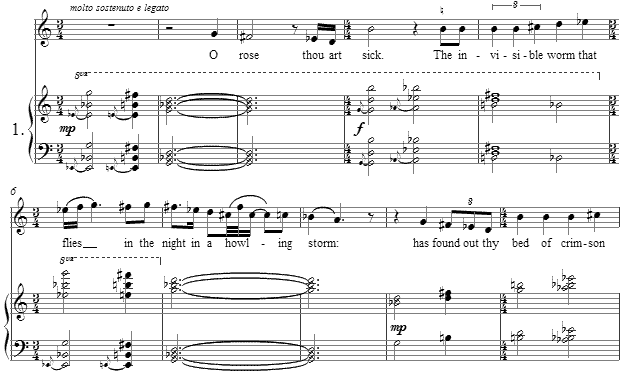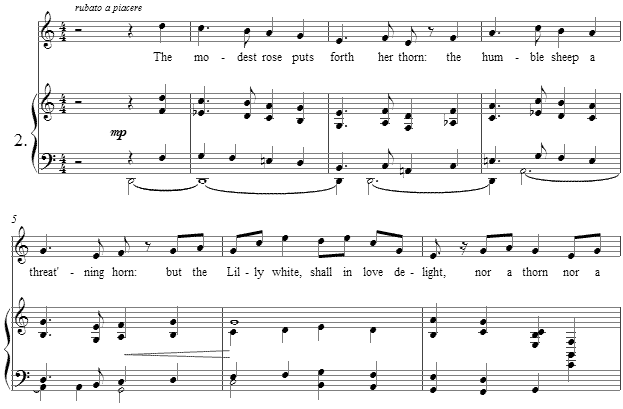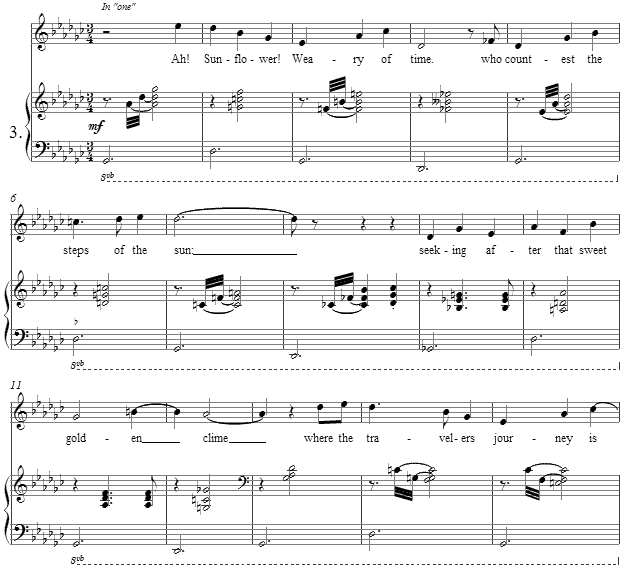Music and Texts of GARY BACHLUND Vocal Music | Piano | Organ | Chamber Music | Orchestral | Articles and Commentary | Poems and Stories | Miscellany | FAQs |
Three Blake Settings - (1990)
William Blake
Three songs for medium high voice and piano
i. The Sick Rose [ 1 page, circa 1' 15" ]
O rose, thou art sick!
The invisible worm
That flies in the night,
In the howling storm,
Has found out thy bed
Of crimson joy,
And his dark secret love
Does thy life destroy.
ii. The Lilly [ 1 page, circa 50" ]
The modest Rose puts forth a thorn,
The humble sheep a threat'ning horn:
While the Lilly white shall in love delight,
Nor a thorn nor a threat stain her beauty bright.
iii. Ah, Sunflower [ 2 pages, circa 1' 00" ]
Ah, sunflower, weary of time,
Who countest the steps of the sun;
Seeking after that sweet golden clime
Where the traveler's journey is done;
Where the Youth pined away with desire,
And the pale virgin shrouded in snow,
Arise from their graves, and aspire
Where my Sunflower wishes to go!
Total duration [ 4 pages, 3' 05" ]

William Blake
William Blake (1757-1827) was an English poet, painter, and printmaker. Though largely unrecognized during his life, today Blake's work, produced in partnership with his wife, Catherine, is renowned. Northrop Frye's study of Blake's entire poetic opus says that his prophetic poems form "what is in proportion to its merits the least read body of poetry in the [English] language". Others have praised Blake's visual artistry, in particular his famed engravings.
Blake himself saw poetry and visual arts as being companions in a unified spiritual endeavor, and they are often inseparable in his work. Blake said, "The imagination is not a State: it is the Human existence itself."
Blake was a strong libertarian, with a deep hatred of the tyranny that was prevalent during his lifetime. This is reflected in his poems 'Songs of Innocence and of Experience', where he portrays upper class institutions and the Church of England as corrupt and exploiters of the weak in society. He dreamed of an idyllic England, free from corruption.
"The Sick Rose" has been interpreted in many ways, among them as metaphor for sexual disease though a better reading is to simply take the text at face value. That which is invisible is not necessary unreal and still may sicken to destroy life.

The rose is again featured with another analogy in this short poem which suggests of the "Lilly" that some beautiful things in life are in some way peace-giving.

The last song is anthropomorphizes the sunflower, seeking that "sun" -- as is the metaphor in Donne's Hymn to God the Father -- which speaks of eternity with God.

Another text of William Blake drawn from his Songs of Innocence (1794) is titled The Divine Image.
The score is available as a free PDF download, though any major commercial performance or recording of the work is prohibited without prior arrangement with the composer. Click on the graphic below for this piano-vocal score.